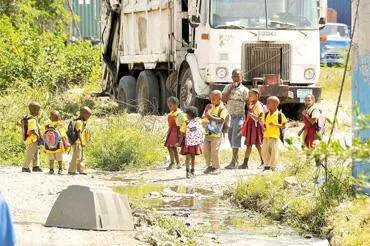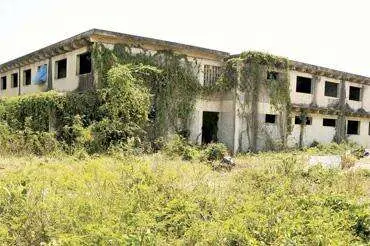
‘We are on our own’
DERRICK Brown has made some mistakes but he wants to ensure that unemployed, unattached young men in Waterhouse, a community that forms a part of Anthony Hylton’s St Andrew Western constituency, do not follow in his footsteps.
He was deported from the United States last year on drug-related charges but says he has a lot to offer in the way of developing the human resources in Waterhouse, where he grew up.
“I have certification in refrigeration and I would like to pass this on to the youth so they can get skills and knowledge so they can earn a living,” Brown says. “I want to see a community centre develop where the youth can learn a trade because they don’t have anything to do but walk and beg… I want to steer them out of trouble so that they will have things to do and look forward to everyday.”
The 59-year- old says he would enlist the help of fellow technicians like John Rogers, who says, “I have trained a lot of younger guys in my time.”
The men’s plans are in tandem with other residents who also highlight the scourge of idleness and the consequent violence that affects Waterhouse and other communities in the constituency.
“Everybody want opportunity. We lack opportunity and we have nobody to tell we grouses to,” says one man sitting under a tree on Pennwood Drive.
The tree, which everyone calls “Big Tree”, is rooted on an empty plot of land which residents say would be ideal for the training and community centre.
In Cooreville Gardens, off Washington Gardens, and Seaview Gardens, off Spanish Town Road, residents have identified land which they say would be ideal for a similar training centre.
“The field going to waste because dem not using it,” says Michael Guy, an electrician from Cooreville. “We can use it to build a centre for tradesmen so we can teach youngsters the trade and employ youth. It will give them hope instead of gunshot. A lot of people want to do this. We have welders, mechanics, electricians.”
Adds a woman in Seaview: “We have a lot of open land so we would appreciate a shopping centre or a training centre so that those on the streets can come off.”
Unemployment is also a major concern for the other communities, including New Haven, Duhaney Park and Riverton Meadows, home of the Riverton landfill.
Most residents are also concerned about the level of violence related to political affiliations and turf, as well as crimes such as car theft and house break-ins in their communities. Washington Gardens and New Haven are examples.
“We have no football or netball going on in the community right now because of the violence,” a male resident of Seaview Gardens says.
A section of the sprawling community called Marley is currently experiencing sporadic bouts of violence.
But the most vexed issue for Seaview is the absence of electricity in whole sections of the community. Under its latest programme to upgrade the electricity infrastructure in the Corporate Area and other sections of the island, the Jamaica Public Service (JPS) disconnected its service from several households in the area. But in large part, the residents say they are being treated unfairly because the light and power company has been refusing to accept inspections done on their behalf by an inspector the JPS itself recommended.
“I have to go back to old-time thing wid lamp and candle,” one man says. “Mi can’t store anything.”
“We haven’t any roads, we haven’t any street lights and we have no one to complain to. We are on our own,” grumbles an elderly woman who overhears the conversation. She doesn’t stop.
Other things residents say the community needs are more street lights, an improved sewage system, the need for an incomplete and unoccupied school building to be put to use and, in the words of a male resident, “They either need to remove Riverton dump or move Seaview.”
The stench and the smoke when the landfill is lit, they say, makes for a difficult life, especially for those with respiratory illnesses.
But while it is a nuisance to many, the landfill is a source of income for several others. They scavenge for ‘treasures’, such as scrap metal, and either resell them or keep them for personal use.
“Most people who don’t have no work depend pon di dump,” says a female resident of Riverton Meadows. “(But) I would like to see the pickney dem pon di dump come off an go school and dem parents get work so dem can send dem to school. You know how much of dem dead (as a result of being on) the dump or have broken limbs?”
She admits that her son is now lying in hospital after suffering a broken leg while “hustling” on the dump.
Across the street in Callaloo Mews, a community built in the late 1990s according to the MP, the numerous challenges — high levels of illiteracy, unemployment and poverty — eclipse the absence of a sewage system.
“Sometimes we see (faeces) on the ground,” says Karen Francis.
In New Haven, a group of residents gathered at a shop agree that the depressed physical condition of the community — with bumpy, unpaved and pothole-riddled roads, uncleaned gullies and drains which cause serious floods in periods of heavy rain — contribute to low self-esteem and self-worth among its youth who are already struggling with unemployment. It is this that leads them to commit crime, they say.
Meanwhile, like Waterhouse which is not currently engaged in gang wars, but where residents say they are always on edge, Duhaney Park, which is divided along political lines, is at peace. But the delicate balance can easily be upset.
If, however, sports programmes and training and long-term employment projects are addressed, residents say the peace could be sustained.
“A lot of idle youth sitting on the corner, coming to shop to beg this or that. They need work,” says one shop keeper.
























